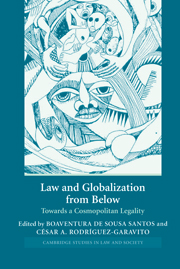Book contents
- Frontmatter
- Contents
- Notes on the contributors
- 1 Law, politics, and the subaltern in counter-hegemonic globalization
- PART ONE LAW AND THE CONSTRUCTION OF A GLOBAL ECONOMY OF SOLIDARITY
- PART TWO TRANSNATIONAL SOCIAL MOVEMENTS AND THE RECONSTRUCTION OF HUMAN RIGHTS
- 8 Limits of law in counter-hegemonic globalization: the Indian Supreme Court and the Narmada Valley struggle
- 9 The Movement of the Landless (MST), juridical field, and legal change in Brazil
- 10 Indigenous rights, transnational activism, and legal mobilization: the struggle of the U'wa people in Colombia
- 11 Defensive and oppositional counter-hegemonic uses of international law: from the International Criminal Court to the common heritage of humankind
- PART THREE LAW AND PARTICIPATORY DEMOCRACY: BETWEEN THE LOCAL AND THE GLOBAL
- Index
- References
10 - Indigenous rights, transnational activism, and legal mobilization: the struggle of the U'wa people in Colombia
Published online by Cambridge University Press: 07 July 2009
- Frontmatter
- Contents
- Notes on the contributors
- 1 Law, politics, and the subaltern in counter-hegemonic globalization
- PART ONE LAW AND THE CONSTRUCTION OF A GLOBAL ECONOMY OF SOLIDARITY
- PART TWO TRANSNATIONAL SOCIAL MOVEMENTS AND THE RECONSTRUCTION OF HUMAN RIGHTS
- 8 Limits of law in counter-hegemonic globalization: the Indian Supreme Court and the Narmada Valley struggle
- 9 The Movement of the Landless (MST), juridical field, and legal change in Brazil
- 10 Indigenous rights, transnational activism, and legal mobilization: the struggle of the U'wa people in Colombia
- 11 Defensive and oppositional counter-hegemonic uses of international law: from the International Criminal Court to the common heritage of humankind
- PART THREE LAW AND PARTICIPATORY DEMOCRACY: BETWEEN THE LOCAL AND THE GLOBAL
- Index
- References
Summary
INTRODUCTION
In an ironic twist, one of the most powerful challenges to globalization has come from the indigenous peoples whose localized, “pre-modern” existence was supposed to have crumbled under the pressure of modern capitalist projects – from that of the colonial project to that of the “development project” (McMichael 2000). Encapsulating the clashing forces of this historical short-circuit, the plight and transnational resistance of indigenous peoples expose with unique clarity the cultural, political, and legal issues at stake in the confrontation between hegemonic and counter-hegemonic globalization.
Several reasons explain the visibility and importance of the indigenous peoples in such a confrontation. First, the indigenous movement involves populations historically subjected to the cruelest forms of exclusion. In Latin America, depending on the area, between 50 and 90 percent of the indigenous population died during the first century of the Spanish conquest, and few tribal groups survived the assimilationist policies of the postcolonial states (Kearney and Varese 1995). Today, albeit comprising the majority or a large portion of the population in several countries (71 percent in Bolivia, 66 percent in Guatemala, 47 percent in Peru, and 38 percent in Ecuador), indigenous peoples continue to be “the poorest of the poor” (Psacharopoulos and Patrinos 1994). In Guatemala, while 53.9 percent of the population is poor, 86.6 percent of indigenous people fall under the poverty line.
- Type
- Chapter
- Information
- Law and Globalization from BelowTowards a Cosmopolitan Legality, pp. 241 - 266Publisher: Cambridge University PressPrint publication year: 2005
References
- 24
- Cited by



